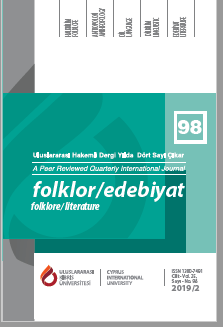Orhan Pamuk’un Yeni Hayat Romanına Psikanalitik Bir Yaklaşım
A Psychoanalytic Approach to Orhan Pamuk’s Yeni Hayat
Author(s): Seda İzmirli KaramanlıSubject(s): Psychology, Turkish Literature, Theory of Literature
Published by: Uluslararası Kıbrıs Üniversitesi
Keywords: psychoanalysis; anxiety; id-ego-superego; creative writers; mirror stage;
Summary/Abstract: In Orhan Pamuk’s Yeni Hayat where the estrangement effect plays a fundamental role, Osman, the main character, narrates his own life which can be considered as meaningful by being converted to a fiction. The cycle of journey occurs in the dark depths of Osman’s subconscious. This cycle bears the signs of rootlessness, desire for liberation, and desire to become a ‘subject’. The image of angel pursued during these journeys points to Osman’s desire to find his existential meaning through an imagined ‘other’ associated with innocence and childhood, to build his identity and to be complete. During these journeys, the angelic image, which appears continuously as a way of salvation, refers to the desire to return to the paradise lost and mother figure; as well as the purification of sin. Eventually, this vicious cycle points to the process of Osman’s self-realization, self-recognition and self-discovery. Thereafter, he completes his ego and become a ‘subject’. In this article, a psychoanalytic approach to Orhan Pamuk’s Yeni Hayat with the help of Sigmund Freud’s and Jacques Lacan’s theoretical perspectives on anxiety, idego- superego, creative writers and day-dreaming, psychoneurosis and mirror stage will be examined.
Journal: Folklor/Edebiyat
- Issue Year: 25/2019
- Issue No: 98
- Page Range: 405-414
- Page Count: 10
- Language: Turkish

